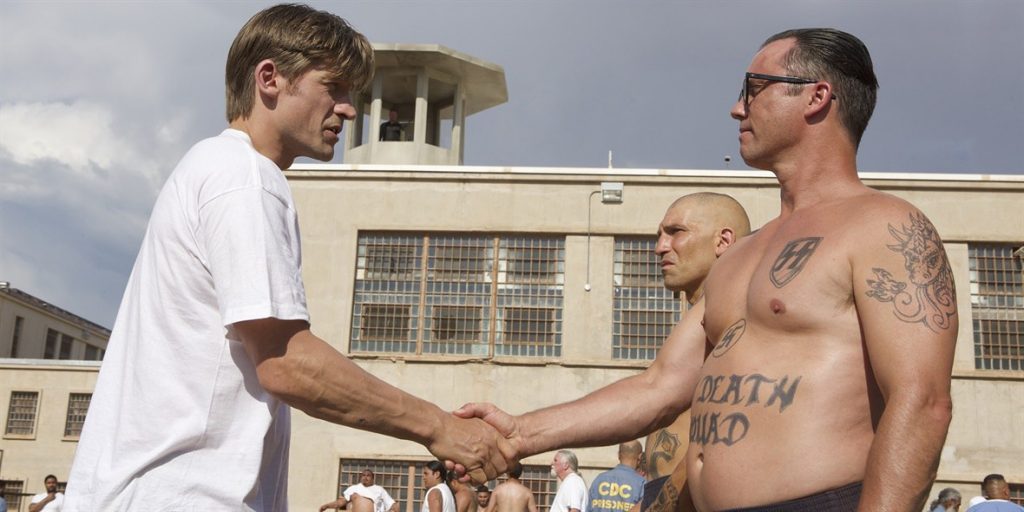
SHOT CALLER
Director: Ric Roman Waugh
Written by: Ric Roman Waugh
Cast: Nikolaj Coster-Waldau, Omari Hardwick, Lake Bell, Jon Bernthal, Emory Cohen, Jeffrey Donovan, Evan Jones, Benjamin Bratt, Holt McCallany
Screened at: Park Ave., NYC, 7/10/17
Opens: July 20 on DirectTV, August 18 in theaters
Prison sucks. If you want to rob a bank and are looking to cover yourself in case you’re caught (and you might be caught, or else why would our jails be overcrowded?) go to Norway. Anders Behring Brievik, the guy who in minutes killed 77 teenagers for the crime of being politically leftist, was sentenced to 21 years. And like others of the clan, he likely received a private apartment with full kitchenware, including knives. (Read the book “One of Us” and seeing Michael Moore’s “Where to Invade Next.”) And he complained that he was denied the videogames he liked. A mass murderer like that should be drawn and quartered in the opinion of most folks, but Norway is a progressive state unlike places like Mexico, Bangladesh, Iran and scores of other countries where convicts do not get apartments with kitchens.
The U.S. is probably among the better prisons, though, for reasonably tolerant conditions, at least when compared to Bangladesh and Mexico. Overcrowding results from overlong sentencing particularly for non-violent crimes, and overcrowding can turn reasonable offenders into bitter, vindictive-seeking hombres, just as you might expect some inmates in Gitmo might be innocent but could become become newly-honed ISIS members if and when they are released.
Notice how many penitentiaries in America are called “rehabilitation centers” or “correctional institutions,” though the only thing they likely correct is their residents’ will to get honest jobs when they’re released. Ric Roman Waugh, who wrote and directs “Shot Caller,” in 2008 directed “Felon”—about a fellow with a good future who unintentionally kills a burglar and is sentenced to a violent prison. He is later transferred to a maximum security institution under the command a corrupt lieutenant. You might guess that Waugh, whose qualifications to do prison dramas include his being a former stuntman, now looks to better box office, again writing and directing what he knows. If we were to consider what Waugh is saying, it’s that prisons are the opposite of rehabilitation centers. They are training grounds for violence both in the jails and outside.
As in his previous movie, Waugh is laying into the prison system, with his principal character, Jacob Harlon (Nikolaj Coster-Waldau) serving to show that there is something wrong with the way we deal with offenders. Harlon, a successful businessman, has the back luck to run a red light, accidentally killing his best friend sitting in the back seat of his car. Because of the law which throws the book at people responsible for violent deaths, he is sent to a maximum security cell, initially offered a plea bargain that would send him away for sixteen months, ultimately for a term of life without parole. How does this happen to a man who is presumably well educated and firm support of his wife (Lake Bell) and young son? Simple answer: prisons can turn reasonably sane and well-educated people into savage beats. It’s not the parole officers like Harlon’s (Omari Hardwick). It’s not the warden or the guards. They are just doing the best they can with a mixed and largely violent population. It’s the fellow prisoners who could make life easier for themselves if they just quietly did their time.
Harlon quickly learns the ropes. Racism is rampant. Whites and blacks stay apart, socializing with their own, at least during those times that they are not literally at each other’s throats. There’s a gang, there’s a rival gang, fights break out, knifings occur, the leaders are sent literally to small cages designed to break their spirit, and cons make plans for additional felonies when they get out. When Harlon, now called by his nickname “Money,” tries to survive, he loses all sense of himself as a rule-following businessman, grows a fu Manchu mustache, combs his hair back, gets his body tattooed, and tells his wife that “it’s over.”
But here’s the problem with the movie. The director appears to want to evoke a masterful performance from his principal character, editing the scenes so frequently, shifting back to Harlon’s early life, then forward to his prison time, then back, then forward. As we watch Jacob Harlon in both guises, we see how prison has changed him, made him a new and not at all better man. This is done to such an extreme that the plot is confusing, requiring some viewers to see the movie again and maybe a third time. I could have done without the saccharine scenes between Harlon and his son—who forgives his dad and follows the older man’s advice to “get on with life.” Most of all though, notwithstanding the effective shots of gang warfare in a maximum security institution and the powerful performance by Danish-born Nikolaj Coster-Waldau (whom you will recognize as Jaime Lannister from “Game of Thrones”), the insistence on a compulsive shifting from his innocent times as a successful financier to his ultimate acceptance of life without parole is simply too garbled and chaotic.
Rated R. 121 minutes. © Harvey Karten, Member, New York Film Critics Online
Comments, readers? Agree? Disagree? Why?
Story – C
Acting – B+
Technical – B
Overall – B-





